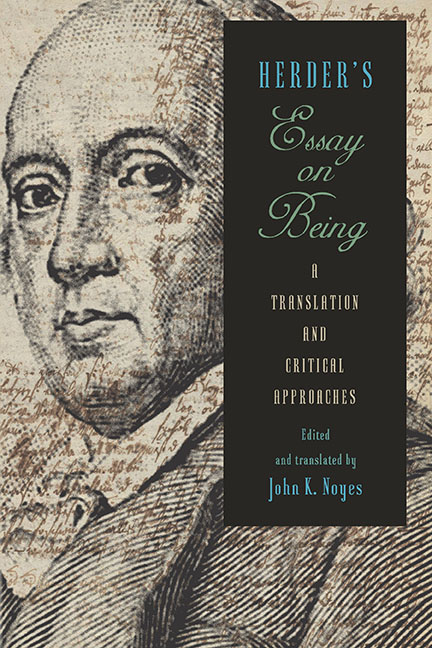Book contents
- Frontmatter
- Contents
- Acknowledgments
- List of Abbreviations
- Introduction: The Essay on Being
- Part I Versuch über das Seyn, by Johann Gottfried Herder
- Part II Critical Essays
- Herder's Essay on Being
- The Order of Being and the Order of Ideas: The Historical Context of Herder's Essay on Being
- Indivisible, Inexplicable, and the Center of All Certainty: Herder's Concept of Being
- The Metaphysical Foundation of Subjective Philosophy in Herder's Essay on Being
- Herder's Kantian Critique of Kant on the Concept of Being
- Attempting to Place the Essay on Being
- Herder's Early Neoplatonism
- Being, Possibility and God: A Comparison of Herder and Heidegger
- Bibliography
- Notes on the Contributors
- Index
Attempting to Place the Essay on Being
from Part II - Critical Essays
Published online by Cambridge University Press: 13 April 2019
- Frontmatter
- Contents
- Acknowledgments
- List of Abbreviations
- Introduction: The Essay on Being
- Part I Versuch über das Seyn, by Johann Gottfried Herder
- Part II Critical Essays
- Herder's Essay on Being
- The Order of Being and the Order of Ideas: The Historical Context of Herder's Essay on Being
- Indivisible, Inexplicable, and the Center of All Certainty: Herder's Concept of Being
- The Metaphysical Foundation of Subjective Philosophy in Herder's Essay on Being
- Herder's Kantian Critique of Kant on the Concept of Being
- Attempting to Place the Essay on Being
- Herder's Early Neoplatonism
- Being, Possibility and God: A Comparison of Herder and Heidegger
- Bibliography
- Notes on the Contributors
- Index
Summary
… a single being, sure and true
—Wallace Stevens, “World without Peculiarity”THE SHORT TEXT Essay on Being has been dated to about 1763 or 1764. It has received relatively little attention. Aside from the commentaries to the editions by Wolfgang Proß and by Ulrich Gaier, the most extensive discussion has been by Hans Adler. Not even the impact of Martin Heidegger's book Sein und Zeit (1927) was sufficient to pull into view Herder's role as a precursor. Nor did the interest in and discussion of Friedrich Hölderlin's “Urteil und Sein” draw Herder's essay along in its wake. Some pertinent observations have been made, notably in a discussion, “Herder's Epistemology,” by Marion Heinz and Heinrich Clairmont in the context of a survey of current Herder scholarship. They stress that although it was not published during his lifetime, the essay is worthy of some scrutiny: “But since the Versuch über das Sein is foundational for Herder's thought in this area, and since essential elements of it—especially the doctrines of Being and of space, time, and force as the basic concepts of human experience—remain constant throughout the metamorphoses of his epistemological conception, it is important to trace the essay's lines of argumentation.” Heinz and Clairmont seem confident about how to approach the essay. They contextualize it with Kant, whose lectures on metaphysics Herder attended in 1763, and in reference to Hume, even though neither is mentioned in the text. Useful as those signposts are, they only mark the beginnings of efforts to see and to locate, to place the Essay on Being. In addition to its fragmentary, disjointed form, the text is difficult to situate because it seems to fall out of line with Herder's other primary concerns. Nor is it easy to align with genres such as the essay, treatise, or exegetical commentary, especially given its poetic tone.
Herder is known for his pioneering work in many areas: cultural studies, anthropology, folklore, world history, aesthetics, and the history of literature come to mind immediately. However, one field where he is only gradually gaining acceptance is philosophy, where the opposition of Kant to Herder's philosophy of history proved quite a barrier.
- Type
- Chapter
- Information
- Herder's Essay on BeingA Translation and Critical Approaches, pp. 151 - 161Publisher: Boydell & BrewerPrint publication year: 2018

